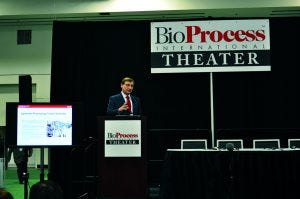- Manufacturing
- Sponsored Content
Comprehensive Hands-On Training for Biopharmaceutical ManufacturingComprehensive Hands-On Training for Biopharmaceutical Manufacturing
August 11, 2016
Sponsored by BTEC
Nathaniel Hentz (assistant director of the analytical laboratory at BTEC) BPI Theater @ BIO, June 7, 2016, 2:20–2:40 pm
 The Biomanufacturing Training and Education Center (BTEC) is part of the College of Engineering at North Carolina State University. In addition to training students and employees in the bioprocess industry, it also provides training for investigators with the US Food and Drug Administration (FDA). BTEC can demonstrate an entire process through upstream production, downstream processing, and drug-product filling in its manufacturing training facility. The center can train students on bioprocess analyticals as well.
The Biomanufacturing Training and Education Center (BTEC) is part of the College of Engineering at North Carolina State University. In addition to training students and employees in the bioprocess industry, it also provides training for investigators with the US Food and Drug Administration (FDA). BTEC can demonstrate an entire process through upstream production, downstream processing, and drug-product filling in its manufacturing training facility. The center can train students on bioprocess analyticals as well.
For the past eight years, BTEC has worked with the FDA in developing a program that trains investigators to work in the biopharmaceutical realm. Many investigators are more experienced with small molecules and food processing. The BTEC training helps them understand present-day biopharmaceuticals.
BTEC breaks the bioprocess up into four courses: quality control (QC) analysis, upstream processing, downstream processing, and aseptic processing (fill–finish). Each course consists of 12 hours on-line with quizzes, an interactive webinar, and three to four days on site for hands-on training. A cohort of 15 students take all four courses within a year. Then they know all that they need to know to do basic pharmaceutical investigations.
In the QC analytical course, BTEC provides an overview of assay attributes, basic statistical parameters in various applications, and analytical methods. Instructors point out the need to consider using sophisticated protein characterization for the more complex molecules. For upstream processing, students learn about microbial and mammalian cell cultures, bioreactor design, unit operations, support operations (such as utilities) and an introduction to process analytical technologies (PAT). For downstream processing, they study recovery technologies, purification formulations, and special topics (e.g., new technologies including single-use technologies and continuous processing). Finally, aseptic processing explores facility design, environment, component preparation, and fill–finish.
BTEC also gathers information about the courses and conducts follow-up evaluations. It has seen positive impacts from the courses. Hentz has spoken with some trainees later on to see how they are implementing what they learned. BTEC courses teach the basics of biomanufacturing. In the future, the center would like to teach students about new technologies, processes, therapies, methods of delivery (injection, oral, patches, inhalables), disposables, new analytical technologies, and the new realm of biosimilars.
Further Reading
Chambers D. The Year of Data Integrity: 2015 Brought a Worldwide Focus on Training, System Design and Control, and Data Management. BioProcess Int. 14(3) 2016: 14–15.
Dillinger P, Fishburn S. Women Helping Women in Biotechnology. BioProcess Int. 11(4) 2013: 80.
Gilleskie G, Brown P. Comprehensive Hands-On Training for Biopharmaceutical Manufacturing: BTEC’s Program to Deliver Training to FDA Investigators. BioProcess Int. 13(8) 2015: 12–21.
Johnson MW, et al. Comparison of Concentration Measurement Technologies in Bioprocess Solutions. BioProcess Int. 13(9) 2015: 60–67.
Langer ES. Hiring and Staffing in Biopharmaceutical Manufacturing: Five-Year Trends Indicate Difficulty in Filling Positions. BioProcess Int. 14(1) 2016: 14–17, 35.
Rosin L. Technologies and Training Move Sterility to New Levels. BioProcess Int. 6(10) 2008: 16–23.
Listen to the complete presentation at www.bioprocessintl.com/BIO2016
You May Also Like






